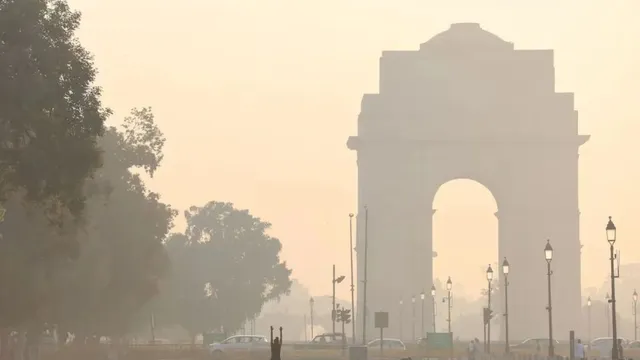- By Chetna Shree
- Tue, 25 Nov 2025 09:15 AM (IST)
- Source:JND
Ethiopian Volcanic Eruption: A massive cloud of volcanic ash from a rare eruption of Ethiopia’s Hayli Gubbi volcano reached Delhi late on Monday night, casting a thin, hazy layer over parts of the city. The eruption, the first time in nearly 12,000 years, sent large ash columns that travelled across the Red Sea and Arabian Sea, passing over Yemen and Oman before arriving over northern India.
According to the India Meteorological Department (IMD), the plume of volcanic ash arrived in Delhi around 11 PM on Monday, coinciding with the city's prolonged spell of hazardous air quality. Residents observed unusually diffused, cloud-like haze over parts of the city, raising questions about whether the volcanic debris would further exacerbate the existing pollution levels.
Will Ethiopian Volcanic Ash Impact Delhi’s AQI?
IMD Director General M Mohaptra clarified that a significant deterioration of Delhi's air quality due to the volcanic ash plume is unlikely. He clarified that the ash is currently circulating at high altitudes, which is well above the atmospheric layers where Delhi’s local pollution typically concentrates, minimising impact at the surface level, Hindustan Times reported.
“It is unclear whether it will impact air quality, but any significant impact is unlikely as it is at higher levels,” Mohaptra said. The IMD official further clarified that the plume's effect near the surface will be marginal as it remains in the "upper levels." However, residents are expected to notice hazy, cloudy skies for a few hours as the ash drifts further eastward.
Mohapatra further added that residents may feel a “marginal rise in temperature,” as the layer can behave similarly to cloud cover, absorbing and re-radiating heat back toward the surface.
Delhi AQI Today
Regardless of the volcanic plume’s limited impact, Delhi’s air quality remained in the “very poor” category on Tuesday morning, registering an Air Quality Index (AQI) of 363 at 8 AM, according to the Central Pollution Control Board (CPCB).
20 out of the city’s 39 monitoring stations recorded AQI levels above 400, placing them in the ‘severe’ range, while the remaining 19 stations fell just below, registering in the ‘very poor’ category.

